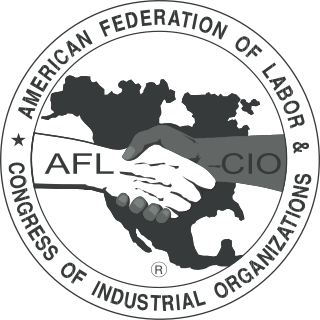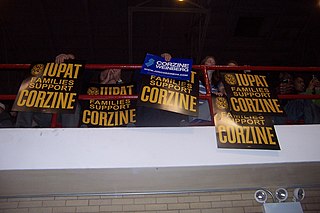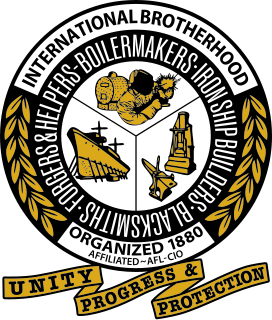Related Research Articles

The American Federation of Labor and Congress of Industrial Organizations (AFL–CIO) is the largest federation of unions in the United States. It is made up of 56 national and international unions, together representing more than 12 million active and retired workers. The AFL–CIO engages in substantial political spending and activism, typically in support of liberal or progressive policies.

The American Federation of Labor (AFL) was a national federation of labor unions in the United States founded in Columbus, Ohio, in December 1886 by an alliance of craft unions disaffected from the Knights of Labor, a national labor union. Samuel Gompers was elected the full-time president at its founding convention and reelected every year, except one, until his death in 1924. He became the major spokesperson for the union movement.

The United Steel, Paper and Forestry, Rubber, Manufacturing, Energy, Allied Industrial and Service Workers International Union, commonly known as the United Steelworkers (USW), is a general trade union with members across North America. Headquartered in Pittsburgh, the United Steelworkers represents workers in Canada, the Caribbean, and the United States. The United Steelworkers represent workers in a diverse range of industries, including primary and fabricated metals, paper, chemicals, glass, rubber, heavy-duty conveyor belting, tires, transportation, utilities, container industries, pharmaceuticals, call centers and health care.

The International Union of Painters and Allied Trades (IUPAT) is a union representing about 100,000 painters, glaziers, wall coverers, flooring installers, convention and trade show decorators, glassworkers, sign and display workers, asbestos worker/hazmat technician and drywall finishers in the United States and Canada. Most of its members work in the construction industry.

The International Brotherhood of Boilermakers, Iron Ship Builders, Blacksmiths, Forgers and Helpers (IBB) is a trade union in the United States and Canada. It is for boilermakers and related occupations, and is affiliated with both the AFL–CIO and CLC.
A Directly Affiliated Local Union (DALU) or federal labor union is a U.S. labor union that belongs to the AFL–CIO but is not a national union and is not entitled to the same rights and privileges within the Federation as national affiliates.

The Seafarers International Union or SIU is an organization of 12 autonomous labor unions of mariners, fishermen and boatmen working aboard vessels flagged in the United States or Canada. Michael Sacco has been its president since 1988. The organization has an estimated 35,498 members and is the largest maritime labor organization in the United States. Organizers founded the union on October 14, 1938. The Seafarers International Union arose from a charter issued to the Sailors Union of the Pacific by the American Federation of Labor as a foil against loss of jobs to the Congress of Industrial Organizations (CIO) and its Communist Party-aligned faction.

The Oil, Chemical and Atomic Workers Union (OCAW) was a trade union in the United States which existed between 1917 and 1999. At the time of its dissolution and merger, the International represented 80,000 workers and was affiliated with the AFL–CIO.
The United Cannery, Agricultural, Packing, and Allied Workers of America union (UCAPAWA) changed its name to Food, Tobacco, Agricultural, and Allied Workers (FTA) in 1944.

Florida AFL–CIO is a statewide federation of labor unions in the state of Florida affiliated with the AFL–CIO. The federation's membership consists of about 450 local unions from 41 international unions. The headquarters of the organization are located in Tallahassee, Florida.
The Labor Council for Latin American Advancement (LCLAA) is a nonprofit, nonpartisan Latino organization affiliated with the AFL-CIO and the Change to Win federation. It was founded in 1972 to provide Latino trade union members in the United States with a more effective voice within the AFL-CIO, to encourage Latino participation in the democratic process, and to encourage the organization of Latino workers into labor unions.

The Department for Professional Employees, AFL–CIO (DPE) is a semi-autonomous "trade" department of the AFL–CIO, and serves as an advocate for professional workers within the federation, and before legislative bodies, the press and the public.
The Maritime Trades Department, AFL–CIO (MTD) is one of seven constitutionally-mandated departments of the AFL–CIO. Formed on August 19, 1946 by the American Federation of Labor, the stated goal of the Department is to give "workers employed in the maritime industry and its allied trades a voice in shaping national policy."

The International Union of Allied Novelty and Production Workers (IUANPW) is an American labor union representing over 18,000 employees. Traditionally it organized workers at toy factories but, as that industry moved overseas, it evolved into a general union in a variety of industries. The union is affiliated with the AFL–CIO.
The Pennsylvania AFL–CIO is a federation of labor unions in the U.S. state of Pennsylvania in the United States. It is an affiliate of the AFL–CIO. It was formed on June 9, 1960, by the merger of two predecessor bodies, the Pennsylvania Federation of Labor and the Pennsylvania Industrial Union Council. It can trace its history through its predecessor bodies to 1890.

The Congress of Industrial Organizations (CIO) was a federation of unions that organized workers in industrial unions in the United States and Canada from 1935 to 1955. Originally created in 1935 as a committee within the American Federation of Labor (AFL) by John L. Lewis, a leader of the United Mine Workers (UMW), and called the Committee for Industrial Organization. Its name was changed in 1938 when it broke away from the AFL. It focused on organizing unskilled workers, who had been ignored by most of the AFL unions.
Puget Sound fishermen's strike of 1949 was a labor strike by fishermen in the Pacific Northwest.

North America's Building Trades Unions (NABTU) is a labor federation of 14 North American unions in the building trade, founded by the American Federation of Labor in 1907.
The United Office and Professional Workers of America (UOPWA) (1937–1950) was a CIO-affiliated union and one of the white-collar unions formed by the CPUSA-breakaway party of Lovestoneites.
References
- ↑ Reynolds, Lloyd G.; Killingsworth, Charles C. (1944). Trade Union Publications: The Official Journals, Convention Proceedings, and Constitutions of International Unions and Federations, 1850–1941. Baltimore: Johns Hopkins Press.
- 1 2 Baunach, Leo. "The International Fishermen and Allied Workers of America: Organizing Precarious Workers in the CIO Era". Waterfront Workers History Project. University of Washington. Retrieved 31 July 2022.